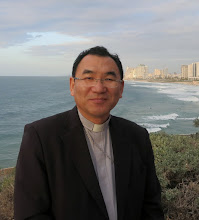Eighth general assembly of Niigata Diocesan Pastoral Council was held on 29 April from 10 am to 3 pm in a new diocesan chancery office's meeting room. All of 5 districts (deanery) in the diocese, namely Akita, Yamagata, Shibata, Niigata and Nagaoka were represented by two lay councilors and a priest. Also the women religious and the diocesan women association were represented. All together there were 22 people attending this annual assembly.
The idea of Pastoral council where representatives of laity, priests and religious come together to share ideas and advice Bishop on pastoral activities and evangelisation activities of the diocese are still new in Niigata diocese. This pastoral council was established after I became Bishop of this diocese in 2004. As the idea of this type of method to share ideas are still new to many in the diocese, what we have been doing so far have been doing continuous evaluation of pastoral priorities of the diocese.
In fact, the pastoral priorities of this diocese have been established based on the past discussions of this council. Present priorities which are the second set of priorities since I took office have been worked out for the centenary celebration of the diocese in October 2012. These priorities are as follows.
1: To build "our Church", one which is filled by joy and compassion through overcoming differences created by age, nationality and cultural diversity.
2: Realizing the responsibilities of the Catholic Church in society through exchanges of information within the diocese, districts and parishes.
3: To continue to nurture and deepen our faith, so that we may be witnesses of the Gospel both through our words and deeds in the midst of contemporary society .
Let me share some points on these priorities from discussions during the Council meeting.
We put "our Church" since there are quite significant number of migrant Catholics in our parish communities who had been treated like "guest" and not a member of "family" for many years. Many of them came to Japan from Philippines to marry with Japanese spouse, mainly local farmers and settled down as wives and mothers of many kids. So it is the must for us to make them feel at home and also continue to provide catechetical formation for these kids.. However, there are number of reports from districts that they found it quite challenging to overcome cultural differences and to have common understanding how to maintain their parish communities together especially financially. Parish in Japan has its own system of registration and monthly due payment based on this registration which has to be well explained.
Also in order to realize responsibilities of the Catholic Church in society, our parish communities should cooperate each other and share information or ideas since our parish communities are small and scattered about in vast area.
Then there are difficulties to realize continuous faith formation for members and keep contact with those who left communities. Unfortunately, with very small number of priests and almost non-existence of religious sisters in the diocese, it is quite challenging to organize substantial course or some sort of it. This is the most challenging issue. Whenever I read monthly news letter from Tokyo Archdiocese, I really envy them. They have more than one page of the news letter with information of variety of formation courses and sessions and more and more offered to faithful in Tokyo area. That is not possible in this rural diocese with people scattered about in 500 km coastal line.
During the Council meeting this time, we also had evaluation of our activities during the Year of Faith and review of Parish Council system in various districts.
P.S. I also have to mention that there are number of non-Japanese Catholics in this diocese who have been making significant contributions in social activities and in the field of education. I also have to mention that I have been emphasizing that the migrant Catholics are missionaries sent by God to Japan especially to the area where traditional parish system are non-existent. In fact, they are making significant contribution to evangelisation.





No comments:
Post a Comment